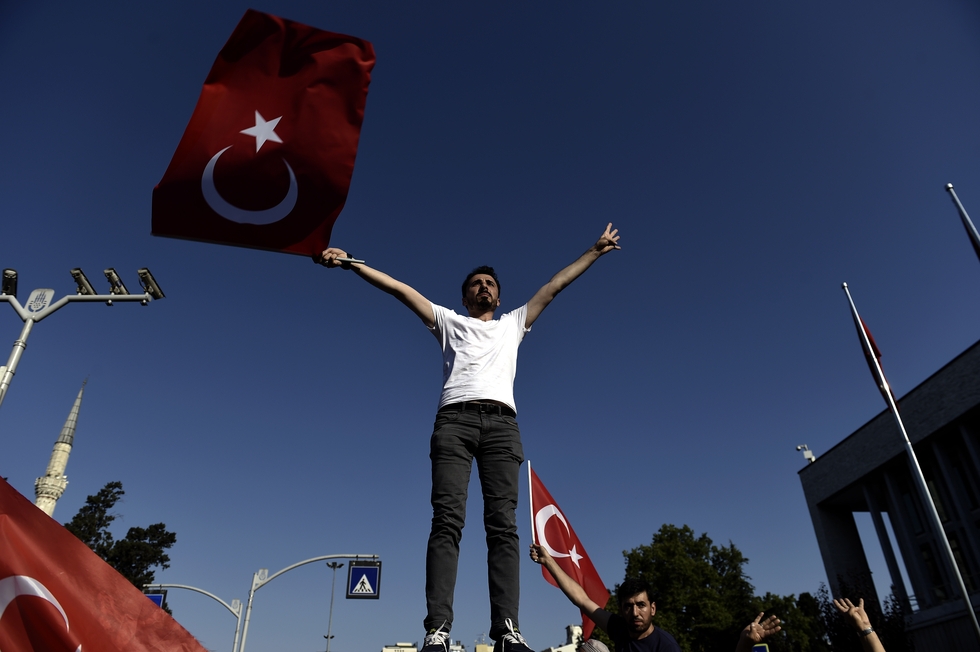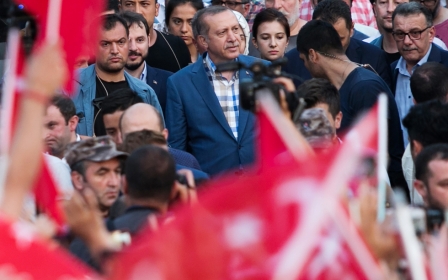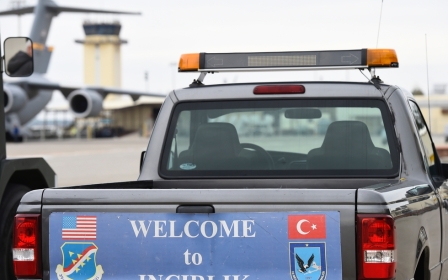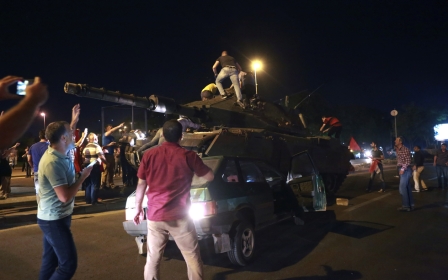The Gulenist terrorists have been defeated in Turkey

Turkey lived through the gravest terrorist attack of her history as dusk fell on 15 July.
This was the third attempt by Gulenists to take power. They tried to arrest Hakan Fidan, the head of the National Intelligence Service (MIT) on 7 February 2012. Subsequently, on 17 and 25 December 2013, they targeted the AK Party (the ruling Justice and Development Party, or AKP) and then Prime Minister Recep Tayyip Erdogan in a judicial coup in coordination with their network of police, prosecutors and judges.
This time an attack orchestrated by a network of Gulenist officers within the Turkish Armed Forces attempted to take the AKP, President Erdogan and the whole country hostage.
Late in the evening, F-16 fighter jets flew over Turkey's parliament, the symbol of the will of the people. They made repeated low passes over parliament, creating sonic booms. News came in that the two bridges over the Bosphorous had been blocked by soldiers.
As people were trying to figure out what was happening, the headquarters of the Joint Chiefs of Staff and many government institutions were taken over by Gulenist officers, and the head of the Joint Chiefs of Staff was taken hostage. Soon afterwards, the anchor of the state-run national television channel read out the coup declaration in a trembling and weak voice. She was doing so at gunpoint.
The perpetrators, who referred to themselves as “The Committee for Peace at Home”, declared their takeover of the country and that martial law was in effect across the nation. This was the most organised attempt in the history of the country to establish military rule. It had all the characteristics of a terrorist attack.
The reaction of the people and politicians alike was swift. Both opposition and pro-government political leaders declared they would resist. The people ignored the declaration of martial law and took to the streets to face the soldiers and the tanks. This public display of defiance pushed the Gulenists to up the ante. Parliament was bombed for the first time in Turkey's history - by Turkey's own fighter jets.
People were shot at by soldiers. According to preliminary reports, about 200 people died, and 2,000 others were injured. But the reaction of the people soon broke the will of the attackers. It was all over in the early morning hours when attackers were captured one by one.
Turkey stopped just as it reached the cliff’s edge. Had it gone over that edge, the drop would have been very sharp and very deep. A notepad of an officer found in a military vehicle captured by the people revealed lengthy instructions. One of the first instructions was that ambulances, fire trucks and municipal vehicles were to be sabotaged, thus threatening to turn the whole country into a gigantic jail. This was the degree of hatred and madness which motivated the Gulenist terrorists. The coup was thwarted by men and women of conscience, mind, and morality.
The people within the state who had organised this were motivated solely by their hatred of the AKP and Erdogan. They had no idea how detached they had become from the social and political reality of the country. They were out of step with both Turkey and the world. They underestimated the will of the people to own its own democracy, its determination to settle the account of past coups; they underestimated 14 years of AKP rule. They thought they could continue with the Turkey's tradition of having military coups.
Society stood up against the Gulenist attempt, while the terrorists thought they could open fire on people and bomb the national parliament. They brought about their own end. This went beyond a mere military coup. It was an attempt to occupy the country from within.
Gulenism and its leader, Fethullah Gulen, created a network with a religious facade. It has a discourse founded on tolerance, democratic and liberal values, fighting against all kinds of tutelage and junta. It was an organisation with educational activities in Turkey and in 130 countries.
Gulenism, beginning with Turkey and in all other countries, is a mechanism which invests in human capital by undertaking educational activities to bring up generations largely consisting of military, police, prosecutors, judges, and intelligence officers. Gulenism has built this mechanism around a religious structure that advocates world peace and interfaith dialogue. Its ultimate vision is to establish a global messianic state and hegemony which aspires to have its own theology as the absolute truth dominating the globe.
However, their accomplishments of the last three years and what they achieved on 15 July 2016 paint a truer picture of what Gulenism is all about.
As with all networked structures, there were many contradictions and inconsistencies with the Gulenist identity. It began as a messianic mission promising the heavens to its followers and ended with terrorism. Theory clashed with practice to the extent that it pointed guns at its own people and forced it to commit a suicidal attack.
Observers of Turkish politics had repeatedly heard the term deep state in the 1990s, which marked one of the most destructive decades in the nation's history. The heavy toll of the 1980 military coup became visible in the mid-1980s and peaked around 28 February 1997 when the army perpetrated the so-called postmodern coup to overthrow the country's democratically elected government and committed serious human rights violations.
Tens of thousands of people lost their lives during this tumultuous period. What followed was the political and economic bankruptcy of a regime based on tutelage. Parliamentary elections on 3 November 2002 opened a new chapter when the AKP formed the first single-party government since the 1980s.
The deep state, however, was bigger than the sort of regimes we had in the 1990s. The deep state continued in cliques that sought to actively and directly interfere in government policy to establish their influence over elected officials. In the 1990s the deep state operated through the proxy of Cold War era actors and therefore relied heavily on Operation Gladio-style organisations, unsolved murders and assassinations.
Today, the term parallel state refers to the deep state organisation that operates within the bureaucracy. While the deep state was traditionally organised in the military and law enforcement to cooperate with paramilitary forces, the contemporary parallel state effectively upgraded its operations and expanded into the police, intelligence and the judiciary.
Back in the 1990s, the deep state did not necessitate judicial power, since the courts voluntarily turned a blind eye to murders among other criminal activities. The rapid democratisation of the post-2002 period, however, rendered the bloody deep state unable to operate and left the contemporary parallel state no choice but to replace violent assaults with judicial operations.
The Gulen movement has since assumed leadership of the deep state and consolidated its power, which it had been slowly building within law enforcement and the judiciary since the early 1980s.
The movement's operational power, however, peaked during the Erdogan administration's struggle against the guardianship regime, when civilians targeted deep state operatives within the armed forces. During this period, Gulenist operatives in law enforcement and the judiciary seized the opportunity to replace the deep state with their own parallel state.
Once the Gulenist parallel state began to operate with help from affiliated members of law enforcement, public prosecutors and judges, the covert organisation gained access to all levels of government. Their potential for growth reached new heights when the Erdogan administration prevented the military from interfering with the 2007 presidential election.
Similarly, the Gulen Movement accumulated significant power during the Ergenekon trials, where the military tutelage regime was brought to justice. Later, the Gulenists turned against the urban-based operatives of the Kurdistan Workers' Party (PKK) as part of the Kurdistan Communities' Union (KCK) trials – which, it turned out, had little to do with the PKK after all. The Gulenist agenda became clear when the movement's operatives attempted to arrest intelligence agency chief Fidan over his alleged involvement with the KCK organisation.
The government's subsequent moves to address the Gulenist parallel state received a strong response from law enforcement and the judiciary in the form of the 17 December 2013 operation, when dozens of seemingly unrelated case files served as the pretext of various arrests and raised doubts about an attempt to overthrow the government.
Just a week later, on 25 December 2013, the next move directly targeted the prime minister and engaged in an open coup attempt. The Gulen Movement, opening fire on the government, sought to use corruption allegations as the silencer on a warm gun. Such is the brief history of the Gulen Movement and their efforts to form a parallel state with help from cabals in law enforcement and the judiciary.
The Gulenists have lost to a reality which they insistently refused to recognise. This is the reality of society and the new Turkey with which they collided. As they closed the book on old Turkey, they have suffered the fate of every suicidal attacker, and self-imploded. This is what happened in Turkey on the night of 15 July. Now it is time for the whole world to understand and learn lessons from the reality of Gulenist terrorism which Turkey has faced during the last three years.
- Taha Ozhan is a member of Turkish Parliament and chairman of the Foreign Affairs Committee. He is an academic and writer. Ozhan holds a PhD in Politics and International Relations. He frequently comments and writes for international media. His latest book is Turkey and the Crisis of the Sykes-Picot Order (2015). You can follow him on Twitter @TahaOzhan
The views expressed in this article belong to the author and do not necessarily reflect the editorial policy of Middle East Eye.
Photo: A man waves a Turkish flag during a demonstration in Istanbul in support the government on July 16, 2016, following a failed coup attempt (AFP)
New MEE newsletter: Jerusalem Dispatch
Sign up to get the latest insights and analysis on Israel-Palestine, alongside Turkey Unpacked and other MEE newsletters
Middle East Eye delivers independent and unrivalled coverage and analysis of the Middle East, North Africa and beyond. To learn more about republishing this content and the associated fees, please fill out this form. More about MEE can be found here.





